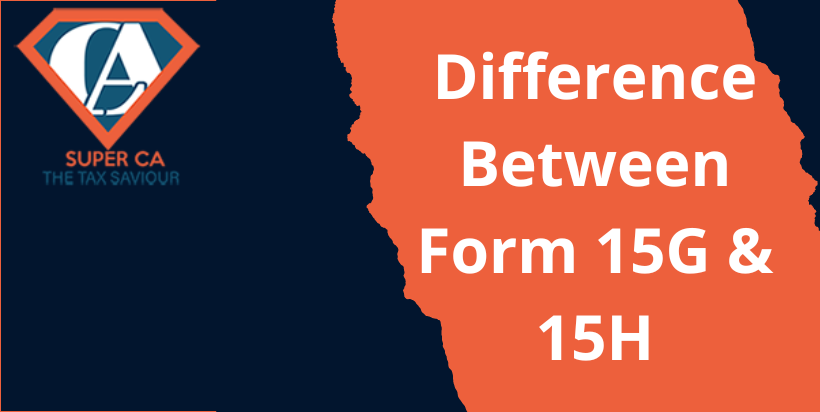
About
The interest received from bank accounts and deposits comes under the ambit of taxation and the bank is required to deduct TDS from it every year if interest exceeds Rs 40,000 for individuals. The limit is Rs 50,000 for senior citizens. This rule is provided under section 194A of the Income Tax Act. But if your total taxable income in an FY is below the threshold limit; i.e. Rs 2.5 lakhs, you can submit Forms 15G and 15H to avoid a TDS deduction on your interest income in such a case. Both allow you to receive full interest on your deposits without any tax deductions but they come along with certain conditions that have to be fulfilled. Both Form 15G and Form 15H are self-declaration forms and come with similar perks, but there are certain differences between them also. In this article, we’ll explain the same with simpler terms.
Definition of TDS
“Tax Deducted at Source”, also known as TDS was introduced with an aim to widen the tax Collection base and have a seamless approach to collecting tax from the point of generation of income. With this, the burden of responsibility of the Tax Collection Agencies and the Deductor is lessened. Under this regime, tax is deducted at the origin of the income. Any deductor liable to make payment of specified nature to any other person or deductee shall deduct TDS and remit the same into the account of the Central Government. TDS prevents people from evading taxes and ensures a steady source of revenue for the Government. Right now, TDS is currently applicable on payments like salaries, rent, professional fees, brokerage, commission, etc.
Form 15G
Form 15G is a self-declaration that can be filled out by individuals less than 60 years of age and HUFs to ensure no TDS is deducted from their interest income for the fiscal year. Form 15G is available under sub-section (1) and (1A) of section 197A of the Income Tax Act. Form 15G allows you to declare your annual income to the banks and request them to stop deducting TDS on your interest income.
Eligibility
The following are some criteria you must keep in mind if you want to fill the Form 15G:
→ He/She must be an Indian citizen
→ He/She must be an individual or Hindu Undivided Family (HUF).
→ Form 15G is not meant for any firm or company
→ He/She must be less than 60 years of age
→ Tax evaluated on net salary must be zero
→ He/She must have a total earning less than the basic exemption threshold of that specific year to fill the form.
Form 15 H
Form 15H is a declaration under sub-section (1C) of section 197A of the Income Tax Act, 1961. It is to be made by an individual having the age of 65 years or more to avoid TDS liability on interest earned from investments such as FDs and recurring deposits (RD).
Notably, Form 15H can be submitted even if the interest income exceeds the basic exemption limit of that year, unlike Form 15G. Thus, a senior citizen can fill Form 15H, even if the interest income is greater than Rs. 3 lakh, but in that case, the total income after applicable deductions must be below the taxable limit.
Eligibility
The following are some criteria you must keep in mind if you want to fill the Form 15H:
→ He/She should be an Indian citizen
→ He/She must be a minimum of 60 years of age
→ His/Her tax evaluation should be zero
Difference b/w Form 15G and 15H
| Parameter | Form 15G | Form 15H |
| Applicability | Only Individuals below 60 years and HUF. Not applicable to any firms/companies. |
Individuals who are 60 years and above (but not HUF) Firms or companies. |
| Basic exemption limit | Annual taxable income should be Rs. 2.5 lakh or less. | Annual taxable income should be up to Rs. 3 lakh (For senior citizens: 60-80 years) Annual taxable income should be Rs. 5 lakh (For super senior citizens: 80 years and above) |
| Conditions | The tax evaluated on your net salary must be zero You must have a total earning less than the basic exemption threshold of that specific year. |
Tax on total income should be nil. Interest income can exceed the basic exemption limit. |
Read More: Difference Between Income Tax and TDS
Conclusion
Both forms can also be submitted at other places for non-deduction of TDS like EPFO at the time of premature withdrawal of PF, Corporate bond issuing companies, To Insurance companies by insurance agents, Post offices for deposits, rents, etc.
Notably, PAN is mandatory to avail of the tax benefits through these forms. Form 15G is for individuals below 60 years and Hindu Undivided Families (HUF), whereas Form 15H is for individuals aged 60+ and companies. It should be noted that the benefits of Form 15G and 15H cannot be claimed by Non-residents.



